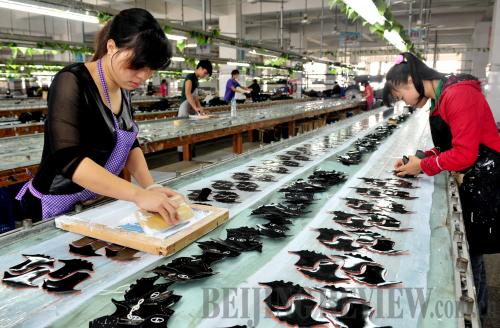|
 |
|
BUSY PRODUCTION LINE: Workers make shoes at a production line of a shoe factory in Jinjiang, southeast China's Fujian Province (ZHANG GUOJUN) |
For the audio please clich here
Since the implementation of China's reform and opening up, one of the country's great achievements has been the rapid development of its private economy.
In fact, the private sector is a major facet of a national economy, significantly promoting people's well-being and encouraging entrepreneurship. The government needs to facilitate the development of the private economy with more support measures.
In the past three decades, the private sector has contributed much to China's social and economic development. Wang Qinmin, Chairman of the All-China Federation of Industry and Commerce, says that non-state enterprises harvested profits of 1.82 trillion yuan ($290 billion) in 2012, and registered an average annual growth rate of 21.6 percent in the past five years. Currently, there are 10 million non-state enterprises and 40 million individual businesses in China, contributing to 60 percent of the country's GDP and 50 percent of tax revenue and creating 80 percent of jobs.
"Small and medium-sized enterprises (SMEs) will make up the bulk of economic growth in the future," said Fu Jun, Vice Chairman of All-China Federation of Industry and Commerce and President of the Beijing-based Macrolink Group.
Facing bottlenecks
As the private sector experiences rapid development, some restraining factors cannot be ignored, such as financing difficulties, high taxes and an unfair competitive environment. In some sectors, barriers like a "swinging door"—privately owned enterprises (POEs) being forced out, and a "glass door"—access restrictions on POEs, keep emerging.
Financing difficulties—believed to be the largest obstacle to the development of the private sector—have been present for years.
Nan Cunhui, President of the Zhejiang-based CHINT Group, a leading industrial electrical equipment producer, suggested that the government accelerate reforms to the financial system, admit various economic bodies to participate in financial market competition and encourage market-oriented allocation of financial resources.
Moreover, he expressed support for setting up funds for private equity and capital turnover, and directing private capital into the real economy by issuing collective bonds.
Liu Yonghao, President of the Sichuan-based New Hope Group, argued that though regulations currently exist to spur the development of the private sector, many SMEs and micro-sized businesses continue to struggle. He suggested banks be required to allocate a certain share of loans to POEs.
Wang Zaixing, President of the Hong Kong-based Howard Group, said the government should remove barriers and interceptions in the implementation of policies and enforce inspection and supervision to ensure SMEs can enjoy policy support equally.
The government should also adopt differentiated financing policies, he said. That is to say, lending requirements should be different for enterprises of different development stages. The proportion of lending to SMEs should be increased.
A financial support system should be put in place to foster independent innovation of SMEs and micro-sized enterprises and a fair competition environment is indispensable to boosting investment in SMEs and micro-sized enterprises, he added.
In addition, administrative and market monopolies should be broken down and market access should be relaxed to attract private investment, according to Wang.
| 